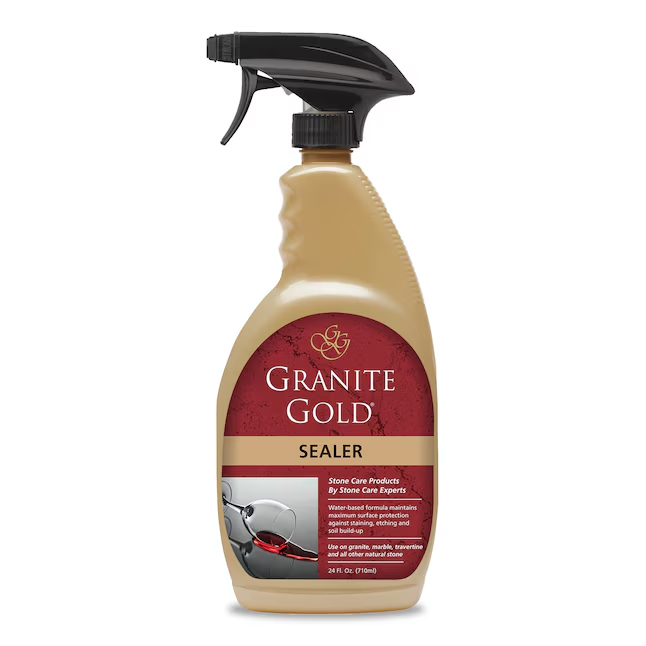Easy care and maintenance for granite countertops
What’s the best selling natural stone for countertops? Granite, of course!
Granite is, hands down, the most popular countertop surface chosen for upscale homes. It’s a substantial investment, though most homeowners would agree that the benefits are well worth every penny spent.
The beauty of a granite countertop is unsurpassed, but it’s not just the aesthetic value that makes this such a popular material – it’s the longevity and granite countertop durability.
Granite countertops can last a lifetime if correctly maintained. Which means it’s vital to learn how to care for it properly!
-
Seal – Seal your granite every six months to one year to help protect it from stains and make it easier to clean.
-
Avoid harsh chemicals – Don’t use products that contain lemon, vinegar, lime, ammonia, bleach, or glass cleaners, as these chemicals can break down the sealant and damage the granite over time. Instead, use a pH-neutral cleaner and a soft cloth or sponge to clean the surface.
-
Keep dry – Prevent hard water and other liquid stains by keeping water off the surface and around the sink and faucets.
-
Blot spills – Wipe up spills immediately with warm water and a mild dish soap.
-
Clean daily – Use a soft cloth to dust the surface, or wipe it down with plain water or a mild soap
FIRST STEP: SEALING

Granite Gold Sealers 24-Oz Granite Sealer
Like any natural stone, granite needs to be sealed to create a nonporous finish and protect it from stains. Proper sealing should be part of the installation process, but it will need re-sealing at least once a year. White granite countertops may need sealing more frequently than darker colors, as they are more likely to show stains. To see if your granite countertop needs sealing, just splash a few drops of water on the surface.
If the water beads up, your countertop is in great shape. If the water is absorbed, it’s time to re-seal. Applying sealer is a simple process. First, make sure the counter is clean and dry. Following the directions on the container, apply the sealer with a clean, dry cloth. Let dry, then apply a second coat. Avoid food preparation on your counter for 24 hours to ensure it is fully cured and water-repellent.
DAILY CARE
When your granite countertop is properly sealed, daily care is a breeze. Just use a soft cloth to dust the surface, or wipe it down with plain water or a mild soap. If your countertop needs extra cleaning, use a specially-formulated stone cleaner with a neutral pH. Never use abrasive cleansers or harsh chemicals.
SPECIAL CARE
Despite good preparation and protection, occasionally your granite countertop may need special attention. Oily stains that have soaked into the surface may be removed by applying a paste made with baking soda and dish soap.
Let sit overnight, covered with plastic wrap, then rinse. If your counter has stains that are difficult to remove, or scratches, contact a stone care professional for repair.
CARE OF CUSTOM FINISHES
The polished finish is still the most popular choice, but other finishes are available, such as honed or leathered. These provide some texture, along with a matte finish, and have special care considerations. Since these finishes tend to be more absorbent, a special penetrating sealer is recommended to protect your countertop from stains, bacteria, and moisture.
Despite being sealed properly, these finishes may still show marks or discoloration when wet, particularly on black granite; this is usually harmless and will disappear when the surface dries.
Granite countertops may require a bit more care than other surface materials, such as man-made, manufactured materials – but most homeowners would agree that the extra work and consideration are well worth the effort. source
HOW TO CARE FOR YOUR GRANITE COUNTERTOPS
.jpg)
What’s the best selling natural stone for countertops? Granite, of course! With over 230 colors available, from subtle to dramatic, there is a wide variety of granite colors and patterns to fit every design taste and style.
And it isn’t just the natural beauty of granite countertops that makes them so popular; in large part, granite’s appeal comes down to durability and maintenance. In comparison to marble countertops and other natural stone slabs, granite is easy to clean and requires little ongoing maintenance.
#1. Guarding Against Spills and Scratches
While preparing meals, it is important to wipe up any spills quickly, especially if they are acidic liquids like citrus juice, alcohol, or vinegar. While sealed granite isn’t as vulnerable to stains as marble countertops, it is still wise to use placemats when eating or drinking acidic foods, set out padded trivets for hot foods, and avoid carelessly dropping sharp tools onto the countertop.
It is easy to keep your countertop like this serene and soothing Costa Esmeralda Granite, looking its finest by paying attention to spills and protecting it from abuse.
#2. Daily Care for Your Slab
When it comes to daily cleaning of your granite countertops, there are a few do’s and don’ts to keep in mind. First, never use a coarse or gritty cleanser on your granite or other natural stone countertops—even those marketed as “soft.” Such cleansers are sure to dull the finish, and will make your beautiful countertops vulnerable to etching and staining.
In addition, avoid products that contain ammonia, vinegar, or bleach as ingredients. Instead, simply use warm, soapy water and a sponge, and then wipe dry with paper towels. Raja Pink Granite countertops will look great for a lifetime when gently cleansed and dried at the end of each day.
#3. To Sealing
Industry experts recommend that virtually all natural stone countertops be sealed; this includes granite, marble, limestone, and onyx. The big difference is that while some of the softer stones like marble require sealing a couple of times a year, granite countertops typically need resealing only once every year or two.
Before sealing your countertop, do a quick test to see if it’s time for resealing. Wet a paper towel and leave it on the counter for 10 minutes. When you remove it, check if the area where the paper towel was is slightly discolored. If you see any discoloration, it means that some water has soaked into the granite, and the countertop should be resealed.
For some areas of your kitchen, like around the range or sink in this island adorned with Mascarello Granite, you might need to seal annually, while other counters in your kitchen that get less wet use may only need resealing every couple of years.
Granite countertops are the top choice of homeowners and home buyers nationwide, and with just a touch of care, they will last a lifetime free from stains, chips, and cracks. source
